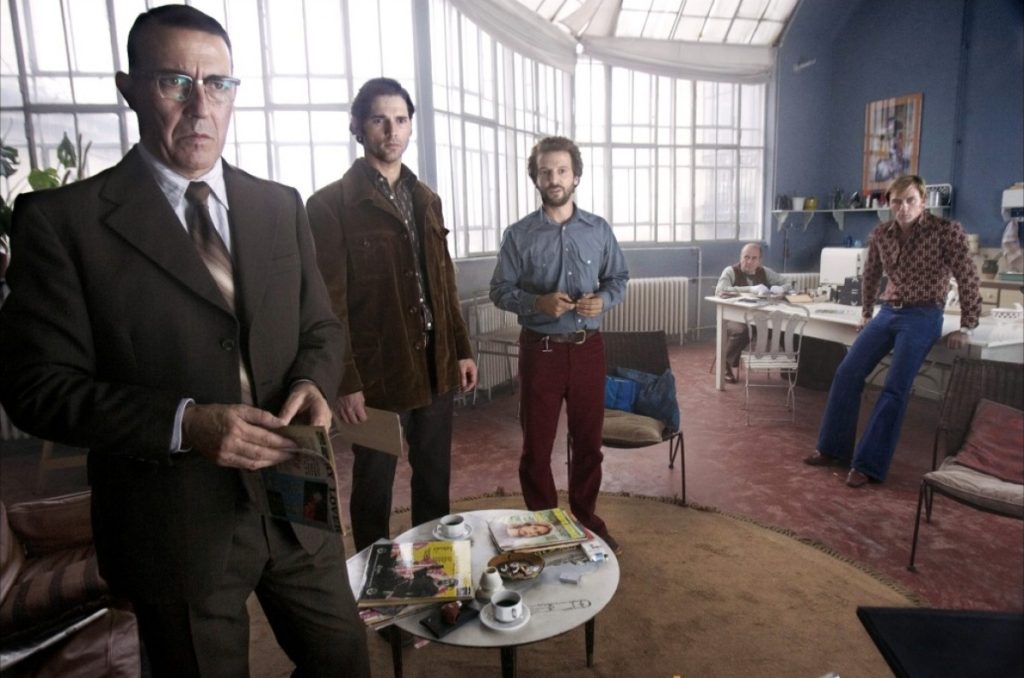Recommended movie: Munich
Wrath of God
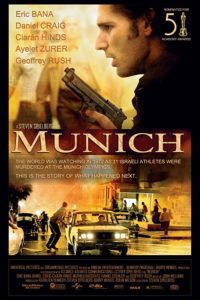 Two aspects are common in the film industry. The first is that, when referring to a historical event, the vision can never be just documentary or fictional. After all, cinema is entertainment and investors want a return on the money spent on the business. The second aspect is that the parties involved are unlikely to agree with what was portrayed. This achievement, displeasing Greeks and Trojans, was got by director Steven Spielberg with “Munich” (USA, 2005), although unfair as the film has an interesting message.
Two aspects are common in the film industry. The first is that, when referring to a historical event, the vision can never be just documentary or fictional. After all, cinema is entertainment and investors want a return on the money spent on the business. The second aspect is that the parties involved are unlikely to agree with what was portrayed. This achievement, displeasing Greeks and Trojans, was got by director Steven Spielberg with “Munich” (USA, 2005), although unfair as the film has an interesting message.
The triggering event of the story, the attack on Israeli athletes at the Munich Olympics in 1972, does not occupy even five minutes of the total, and even so, it is shown in sparse flashbacks throughout the film. The Palestinian group called Black September invades the Olympic Village and kidnaps eleven Israeli athletes. The act turns into tragedy when in a disastrous rescue attempt by the German police, all hostages are killed by the kidnappers.

It is from this point that the history of “Munich” begins. The Israeli government decides to retaliate against Palestinian terrorists by executing them wherever they were. Avner Kauffman (Eric Bana), a Mossad agent, the Israeli Secret Service, is tasked with setting up a group to eliminate targets from Europe.
Over the next few months, Avner and his group traverse their via crucis, surrounding targets, preparing for attacks, and having to fight to preserve their own lives, since, in a short time, they themselves are wanted by Palestinian agents, professional killers and all European police.
 As time goes by, Avner begins to wonder if what they are doing is correct, as it is not always very clear whether that target, specifically, participated in the Munich tragedy. There is even a dialogue between him and a Palestinian agent, where they discuss the reasons on each side, and the motivations for doing what they are doing.
As time goes by, Avner begins to wonder if what they are doing is correct, as it is not always very clear whether that target, specifically, participated in the Munich tragedy. There is even a dialogue between him and a Palestinian agent, where they discuss the reasons on each side, and the motivations for doing what they are doing.
When Avner decides to drop everything and take care of his own life, discovers that his group was just one of many who participated of retaliation to the Palestinians. In the final dialog of the film, where he once again reaffirms not believe in violence as a means of solving things, appears in the background the twin towers of the World Trade Center, digitally recreated, as a symbol of peace message of the movie.
 When the film was released, there was shouting from all sides. Palestinians and Arabs, in general, complained about the way they were portrayed in the screen. The Israelis say the story is entirely different from what actually happened. Spielberg fans, used to his productions full of action scenes and special effects, were surprised by a more discreet and restrained movie.
When the film was released, there was shouting from all sides. Palestinians and Arabs, in general, complained about the way they were portrayed in the screen. The Israelis say the story is entirely different from what actually happened. Spielberg fans, used to his productions full of action scenes and special effects, were surprised by a more discreet and restrained movie.
It’s not that the action scenes don’t happen, they are more integrated into the story, without the crazy fantasies of “Jurassic Park” (USA, 1993) or “Minority Report” (USA,2002). “Munich” always shows the story through Avner’s perspective, with growing pessimism in relation to his mission, which is reflected in the dark tones of the film.
 If there is sin in “Munich” is exactly little exploring the kidnapping itself, which is a well known fact for older people, have little or no impact for younger generations, who were not even born in 1972, and not by chance, are the majority of Spielberg’s legion of fans.
If there is sin in “Munich” is exactly little exploring the kidnapping itself, which is a well known fact for older people, have little or no impact for younger generations, who were not even born in 1972, and not by chance, are the majority of Spielberg’s legion of fans.
On the other hand, the director tried not to exacerbate the relationship, always delicate, between Jews and Palestinians, ever present in the news about the Middle East. The Black September organization was an armed faction of the PLO – Palestine Liberation Organization, led by Yasser Arafat, which was still little known in the rest of the world, until the events of 1972.
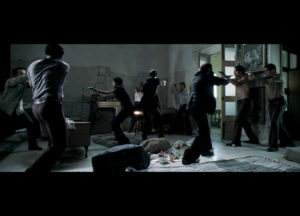 Four decades later, the Palestinians achieved some territorial accommodation, Arafat he died, and the most radical faction, Hamas, managed to elect the majority of deputies, which already provokes a wave of threats and warnings from Israel, the United States, and other countries. In other words, year in, year out, little progress has been made in terms of peaceful coexistence.
Four decades later, the Palestinians achieved some territorial accommodation, Arafat he died, and the most radical faction, Hamas, managed to elect the majority of deputies, which already provokes a wave of threats and warnings from Israel, the United States, and other countries. In other words, year in, year out, little progress has been made in terms of peaceful coexistence.
This, incidentally, is the message that is implied in “Munich”. Little or nothing has been achieved through violence, either in the history of Mankind or in the Middle East. The great merit of the movie, more than revive wounds barely healed, is to promote discussions on violence of individuals, organizations or states. It does not take much effort to understand the perfect logic of Ghandi, for who “those live according to the idea of an eye for an eye, the world will end up blind”. Words of a man who was brave enough to respond to violence with no violence.
A curiosity of this movie is the participation of Daniel Craig in a supporting role, which in the following year would debut brilliantly as the new James Bond in the film “Casino Royale” (UK, 2006).
What was Munich, 1972
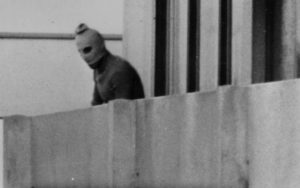 The 1972 Munich Olympics were one of the first games to be broadcast on a large-scale TV worldwide. However, the event was marked by a tragedy. On September 5, four days before the end of the games, a group of Palestinian terrorists belonging to the Black September group, the PLO’s armed wing, broke into the Israeli delegation’s quarters. Two athletes were killed during the attack and eight other Israelis were also held prisoner by the Palestinians.
The 1972 Munich Olympics were one of the first games to be broadcast on a large-scale TV worldwide. However, the event was marked by a tragedy. On September 5, four days before the end of the games, a group of Palestinian terrorists belonging to the Black September group, the PLO’s armed wing, broke into the Israeli delegation’s quarters. Two athletes were killed during the attack and eight other Israelis were also held prisoner by the Palestinians.
The group demanded the release of 234 Palestinians, held in Israeli prisons. Golda Meir, Israel’s prime minister, denied the request. The German government, on account of the Holocaust, wanted anything but to see Jews being murdered again in its territory.
The negotiations lasted all day, and the competitions were suspended for 24 hours, a fact never before in the history of the Olympics. The German government, led by its Prime Minister Willy Brandt, refused to receive an Israeli military special operations team, which was a proposal by the Israeli government.
 It was already dark when the West Germans announced a solution. The terrorists and hostages were taken to a military airport, Fürstenfeldbrück, where they would take a plane that would take the Palestinians to Egypt. However, snipers secretly awaited them.
It was already dark when the West Germans announced a solution. The terrorists and hostages were taken to a military airport, Fürstenfeldbrück, where they would take a plane that would take the Palestinians to Egypt. However, snipers secretly awaited them.
The operation was poorly planned, carried out by inexperienced policemen, without sufficient firepower, without communication and without correct information. As soon as the shooting started, one of the terrorists threw a grenade into the helicopter, where the Israelis were, who died from the explosion. Among the terrorists, five were killed and three were arrested. A police officer was also killed in the shooting.
The three prisoners were never tried. On October 29, 1972, a Lufthansa plane was hijacked by another terrorist group, which demanded the release of the three imprisoned Palestinians. The German government immediately released the Munich terrorists, without consulting the Israeli government. In return, the German hostages (all men, a very strange fact) were released.
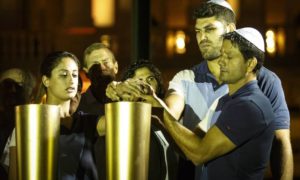 Two of the released terrorists were reportedly killed by Israeli agents in the operation Wrath of God, that was the theme of the film “Munich”, and the third died in 2010, due to health problems.
Two of the released terrorists were reportedly killed by Israeli agents in the operation Wrath of God, that was the theme of the film “Munich”, and the third died in 2010, due to health problems.
In August 2016, during the Olympic Games in Rio de Janeiro, for the first time in Olympic history there was an official recognition in memory of the victims of Munich .

